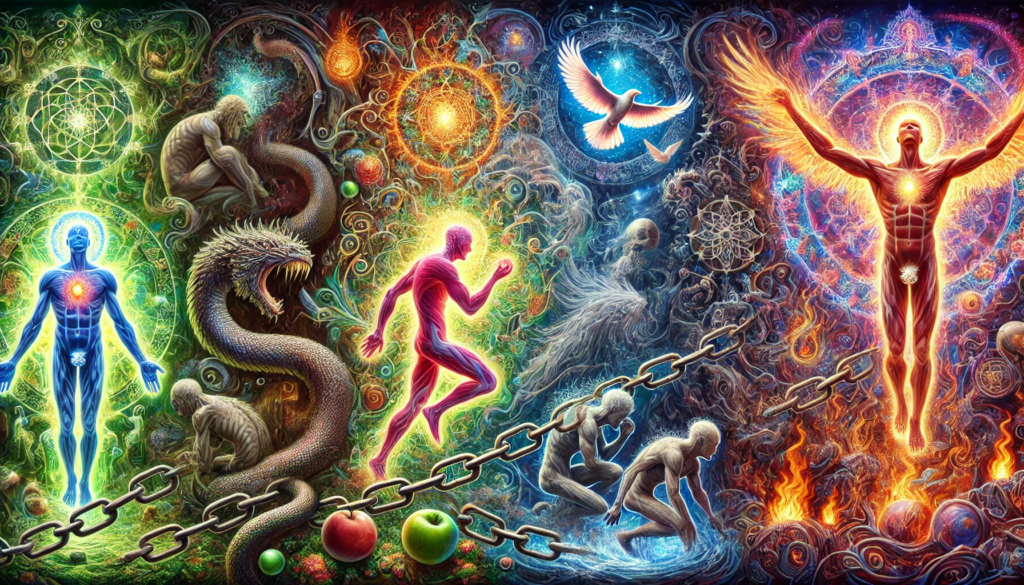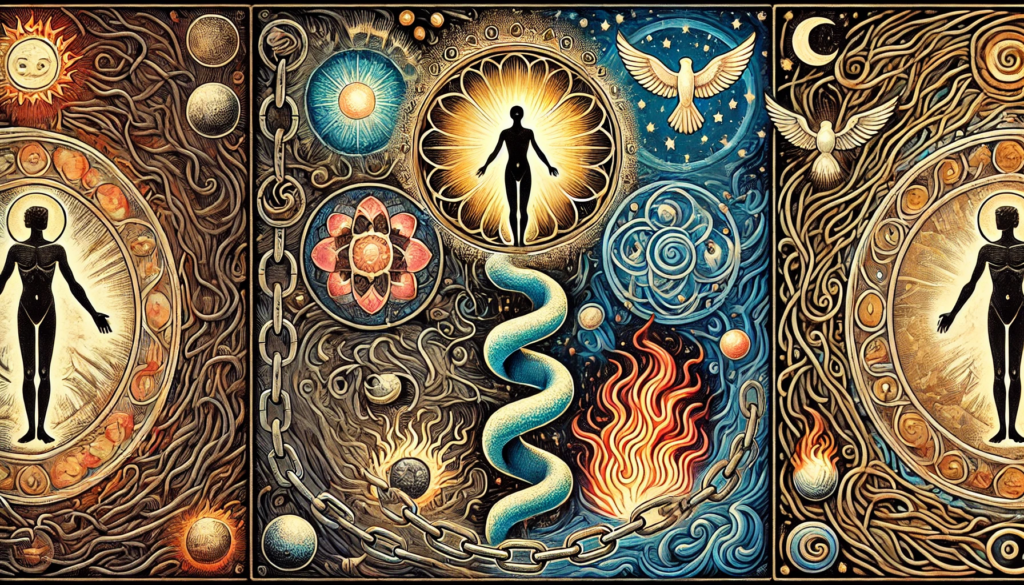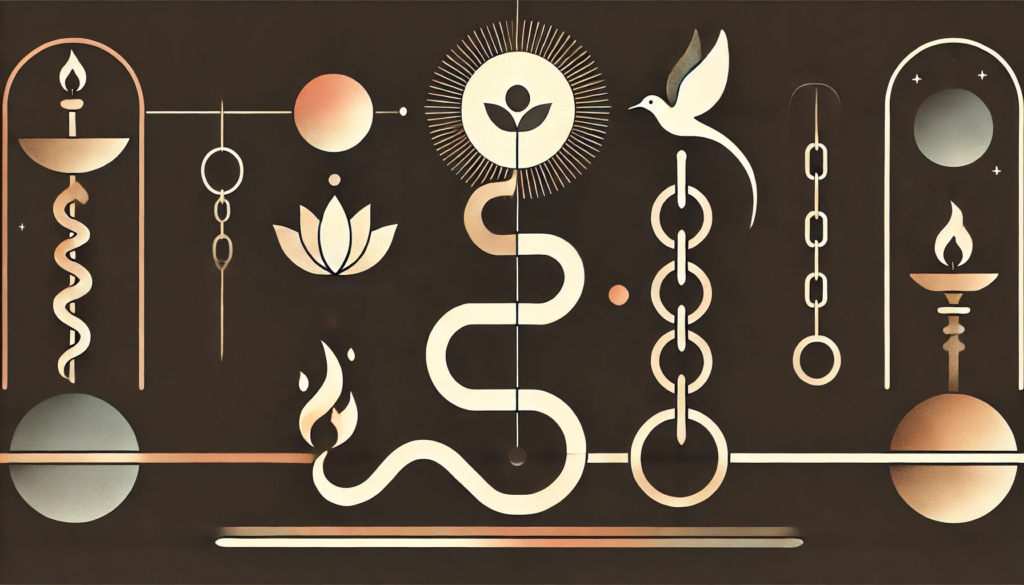
ChatGPT:
The Progress of the Soul: Expanded Summary
John Donne’s “The Progress of the Soul”, also known as “Metempsychosis”, is a metaphysical exploration of the soul’s journey through time, space, and existence. Written in 1601, the poem is subtitled “The Second Anniversary,” indicating it was meant to follow his earlier reflections in “The First Anniversary.” This poem is both an imaginative narrative and a philosophical meditation on themes of sin, transformation, and the human condition.
🪞 Overview of Themes and Structure
1. The Concept of Metempsychosis
The poem uses the ancient philosophical concept of metempsychosis—the transmigration of the soul from one body to another—as its foundation. Donne presents this transmigration not as a noble ascent toward enlightenment but as a series of morally compromised transitions. Through this lens, the soul mirrors humanity’s imperfection.
2. Sin and Origin
The journey begins in the Garden of Eden, where the soul inhabits the forbidden fruit, suggesting its association with humanity’s Original Sin. From its first existence, the soul is tied to corruption and temptation, setting the stage for its fall and ongoing cycles of rebirth. Donne uses this origin to highlight how humanity cannot escape its flawed nature.
3. Transitions Through Forms
The soul’s journey through various forms—a fish, a bird, and eventually human beings—illustrates the wide spectrum of existence. Each transformation reflects a specific human vice or folly, critiquing societal and individual failings. These changes serve as metaphors for human experience and moral lessons.
🌀 Detailed Exploration of Key Episodes
1. The Soul in Eden
The poem begins with the soul in Eden, housed in a forbidden fruit. Here, Donne underscores the soul’s earliest encounter with sin. As the fruit is consumed, the soul begins its descent, moving into other forms. This sets the tone for the poem: sin as an inevitable part of existence.
2. Animal Incarnations
The soul takes on various animal forms. For example, it inhabits a fish, a creature often associated with the depths and the unknown, symbolizing human greed or ignorance. Donne uses these incarnations to interrogate how the soul reflects humanity’s base desires.
3. Transition into Humans
Eventually, the soul is born into human beings. Donne emphasizes the vices and hypocrisies of humans, such as pride, ambition, and vanity. By focusing on human imperfections, the poet critiques the idea that humanity is inherently closer to divinity than animals.
4. The Question of Progress
Despite the poem’s title, Donne questions whether the soul truly “progresses.” Each new life brings new forms of entanglement with sin. This cyclical failure raises doubts about the concept of moral or spiritual progress, painting a picture of human existence as repetitive and flawed.
5. The Satirical Undertone
Although the poem deals with weighty themes, it is infused with Donne’s characteristic wit and satire. He critiques not just individuals but societal structures, exposing the contradictions and absurdities of human behavior.
🌌 Philosophical and Theological Reflections
1. The Nature of Sin
Donne’s portrayal of the soul underscores the ubiquity of sin. Whether in Eden or modern life, the soul cannot escape its flawed nature, reflecting the Christian belief in humanity’s fallenness.
2. The Role of Rebirth
While reincarnation traditionally implies a chance for redemption, Donne portrays it as a vehicle for continued failure. The soul’s rebirths do not elevate it but instead re-entangle it in material and moral corruption.
3. Divine Judgment
The poem ends ambiguously, leaving the reader to ponder the soul’s ultimate fate. Donne suggests that divine grace might offer redemption, but he does not present a resolution, reflecting the tension between hope and despair in Christian theology.
✍️ Language and Style
1. Heroic Couplets
The poem is written in heroic couplets—pairs of rhymed iambic pentameter lines. This form gives the poem a formal, reflective tone, while also allowing for witty, epigrammatic observations.
2. Grotesque and Vivid Imagery
Donne’s descriptions are often grotesque, as he depicts the soul’s transitions through flawed, physical bodies. These vivid images serve to highlight the stark reality of sin and human weakness.
3. Intellectual Complexity
The poem’s allusions to theology, classical philosophy, and natural science showcase Donne’s intellectual depth, inviting the reader to engage with its layers of meaning.
🌿 Concluding Themes
1. Humanity’s Cyclical Struggles
The soul’s journey underscores the repetitive nature of human failings. Despite its various incarnations, the soul does not achieve purity or enlightenment, reflecting the persistent flaws of human nature.
2. The Paradox of Progress
The poem critiques the very idea of progress, suggesting that humanity’s striving often leads to greater entanglement in sin rather than liberation.
3. Hope for Redemption
While Donne critiques human failings, he leaves space for the possibility of divine grace. The soul’s journey is open-ended, implying that redemption may yet be achieved through divine intervention.
💡 Key Takeaways
1. The poem uses the idea of metempsychosis to explore themes of sin and transformation.
2. The soul’s origin in Eden ties it to humanity’s shared legacy of corruption.
3. Transitions through various life forms highlight the persistence of vice and folly.
4. Donne critiques humanity’s inability to transcend its base desires.
5. The poem questions whether true spiritual progress is possible.
6. Theological elements frame the narrative within Christian ideas of fallenness and redemption.
7. Vivid imagery and heroic couplets create a balance between intellectual depth and satirical wit.
8. The poem is deeply philosophical, inviting reflection on the nature of sin and grace.
9. The soul’s open-ended journey suggests both the inevitability of failure and the hope for divine intervention.
10. Donne’s critique extends to societal structures, making the poem both personal and universal.

Quotes from The Progress of the Soul by John Donne
Here are some key excerpts and insights from the poem, offering philosophical, theological, and moral reflections. While the poem is lengthy and complex, these lines capture its essence:
1. On the Soul’s Origin and Sin
“I sing the progress of a deathless soul,
Whom fate, which God made, but doth not control.”
• Donne reflects on the eternal nature of the soul, suggesting that its journey is shaped by fate and divine will, but not entirely free of human corruption.
2. The Soul in Eden
“It was but forbid to be a tree,
And now, that souls are needed, it must be.”
• This line refers to the soul’s initial habitation in the forbidden fruit in the Garden of Eden, tying its existence to the Fall of Man.
3. The Soul’s Transitions
“Through fishes, birds, beasts, man, it passed, till,
By way of death, it did at last fulfill.”
• Donne outlines the journey of the soul through various creatures, showing the cycle of reincarnation as both physical and spiritual transformation.
4. On Human Corruption
“Man is the world, and death the ocean,
To which God’s mercy is the shore and sun.”
• Humanity is depicted as inherently flawed, navigating life and death with the hope of God’s mercy as salvation.
5. Critique of Human Vanity
“But man, who in his deeds would grow divine,
When to be good, his crest is to incline.”
• A satirical comment on human pride and ambition, contrasting the desire for divinity with the reality of moral weakness.
6. The Nature of Progress
“But no perfection is so absolute,
That some impurity doth not pollute.”
• This line encapsulates one of the poem’s key themes: the impossibility of achieving true purity or perfection in human existence.
7. On Spiritual and Physical Realms
“Who shall ascend? for death dwells everywhere.”
• A sobering reflection on mortality and the difficulty of attaining spiritual elevation while bound to physical existence.
8. Open-Ended Reflection
“Thus in him the soul of mankind dwells,
Till grace end all, and grace itself excels.”
• Donne leaves the soul’s journey unresolved, emphasizing the potential for divine grace to intervene and conclude its progress.
Key Interpretive Notes:
• Donne employs paradoxes and metaphysical imagery to probe the tension between the soul’s immortality and its entanglement in earthly sin.
• The poem critiques human aspirations, suggesting that even our highest ideals are often undermined by vanity and folly.
• The ambiguity of the ending invites readers to ponder the role of divine grace in the soul’s ultimate fate.
FAQs on The Progress of the Soul by John Donne
Q: What is The Progress of the Soul about?
A: The Progress of the Soul explores the journey of a soul through various incarnations, starting from the Garden of Eden and passing through animals and humans. It examines themes of sin, redemption, human folly, and the struggle between spiritual aspirations and earthly corruption.
Q: What does the title The Progress of the Soul mean?
A: The title suggests a metaphysical journey or transformation of the soul, often associated with reincarnation or spiritual growth. However, Donne critiques the idea of “progress,” showing that the soul often remains mired in sin and imperfection despite its transitions.
Q: What is the concept of metempsychosis, and how is it used in the poem?
A: Metempsychosis is the idea of the soul’s transmigration from one body to another after death. Donne uses it as a framework to narrate the soul’s experiences in different forms, such as a forbidden fruit, animals, and humans, reflecting humanity’s recurring moral and spiritual failings.
Q: How does the poem begin?
A: The poem begins with the soul’s origin in the forbidden fruit in the Garden of Eden, symbolizing its connection to humanity’s Original Sin. This sets the tone for the soul’s ongoing struggles with sin throughout its journey.
Q: What is the main theme of the poem?
A: The central theme is the soul’s entanglement in sin and its quest for redemption. Other key themes include the nature of human imperfection, the tension between physical and spiritual existence, and the possibility of divine grace.
Q: Does the soul achieve redemption in the poem?
A: The poem ends ambiguously, leaving the soul’s ultimate fate unresolved. Donne implies that redemption is possible through divine grace but does not provide a definitive conclusion, emphasizing the ongoing struggle for spiritual purity.
Q: How does Donne critique human nature in the poem?
A: Donne satirizes human vanity, pride, and hypocrisy. By showing the soul’s repeated moral failings across different incarnations, he critiques humanity’s inability to transcend its baser instincts and achieve true progress.
Q: What is the tone of the poem?
A: The tone is a mix of serious theological reflection and biting satire. Donne combines intellectual depth with wit and humor, making the poem both profound and critical.
Q: What literary devices does Donne use in the poem?
A: Donne employs vivid imagery, paradoxes, and metaphysical conceits to explore complex theological and philosophical ideas. The poem is written in heroic couplets, which add rhythm and elegance to its structure.
Q: How does the poem reflect Donne’s religious beliefs?
A: The poem reflects Donne’s preoccupation with Christian theology, particularly the ideas of Original Sin, divine judgment, and grace. It conveys his belief in the fallen nature of humanity and the possibility of redemption through God.

